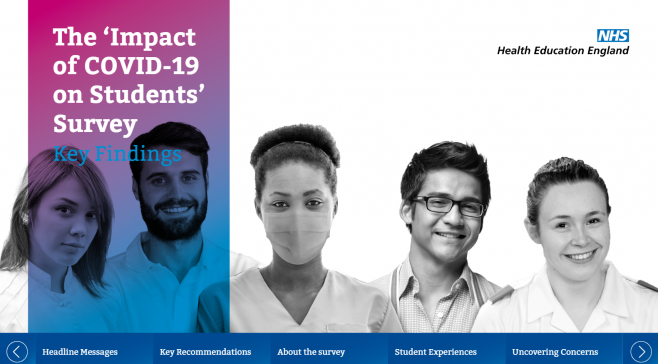You are here
Reducing Pre-registration Attrition and Improving Retention
The RePAIR (Reducing Pre-registration Attrition and Improving Retention) project has enabled HEE to gain an in-depth understanding of the factors impacting on healthcare student attrition and the retention of the newly qualified workforce in the early stages of their careers.
The ‘Impact of COVID-19 on Students’ Survey Key Findings
In May 2020 we asked the RePAIR team to undertake a survey to capture the experience of pre-registration nurses, midwives and AHPs (Allied Health Professionals) during the first wave of the pandemic.
The first COVID wave changed student experiences in several profound ways including: 
- The students who were on an extended placement were largely positive about their experience – although anxious about catching up on their academic studies.
- The students who focused on academic studies were very positive about contacting the academic staff but less so about the online learning especially completing learning outcomes.
- The reasons behind students thinking about leaving are: academic concerns; being overwhelmed and stressed by the situation they find themselves in; and doubting their clinical ability.
Read the full report including key findings below.
The ‘Impact of COVID-19 on Students’ Survey Key Findings
Reducing Pre-registration Attrition and Improving Retention Report (2018)
Covering the four fields of nursing (adult, child, learning disabilities and mental health), midwifery and therapeutic radiography, RePAIR explores effective interventions to improve retention across the student journey – from pre-enrolment to two-years post-qualification. Take a look at the executive summary.
This extensive national study is based on detailed insight from numerous stakeholders including nearly 3,500 pre-registration students, service and university representatives, regulators, and policy makers.
The overriding message from the RePAIR Report (2018) is a positive one, in that a 96% of students agreed that they had made the right decision in enrolling on their course. However, the study has identified a range of factors, which if unaddressed, could affect the supply of newly qualified practitioners – these include financial pressures, student confidence levels and the importance of the clinical component of a course to students which is heavily influenced by the clinical supervisor (or mentor) and the culture in that clinical setting.
Recommendations set out what should be done system wide to improve retention. These include ensuring prospective students really do understand the career they have chosen and the requirements of the course, encouraging the creation of buddy schemes to provide support to students during their studies, standardisation of practice assessment documentation and the importance of preceptorship schemes.
The RePAIR toolkit, is aimed at all those involved in the education, training and supervision of pre-registration healthcare students and those who are newly qualified. It showcases excellent examples of best practice and effective interventions from across the country designed to improve retention and a bespoke cost calculator developed to encourage organisations to investigate the costs and benefits of local retention initiatives.
In her foreword to the report, Professor Dame Christine Beasley, Chairman of the RePAIR steering group, said:
Attrition has been under the spotlight for many years and whilst not all attrition should be considered negatively, unnecessary attrition does incur a significant cost to the health and care system – to universities and to healthcare providers and, importantly it impacts on the health and wellbeing of healthcare students and those who are newly-qualified.”
Professor John Clark, Regional Chief Nurse who led the RePAIR project at HEE added:
Attrition is everyone’s business. Every individual or organisation providing pre-registration healthcare education or contributing to clinical placement education must ask how they can work together with HEE to respond to the recommendations made in this report.”